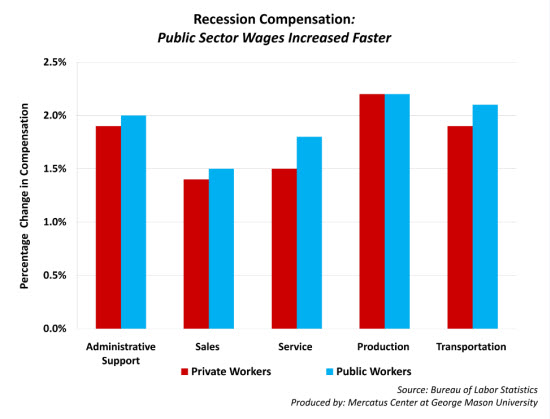
Private sector workers suffered tremendously during the past recession through job loss, reduced wages and benefits and reduced hours. This is one of the costs of a dynamic and free society - the business cycle in a market economy does trend upward over time leading to increasing standards of living. However, the fluctuations in the cycle fall heavily upon individuals - think of typewriter manufacturing workers, workers manufacturing VCRs, horse and buggy manufacturing workers, milk delivery drivers, well the list does tend to go on and on. These workers did in fact lose their jobs not to cyclical unemployment but structural unemployment. And it is good that they lost their jobs. For without the creative destruction that is embedded in the market order, free societies are doomed.
"Joseph Schumpeter (1883–1950) coined the seemingly paradoxical term “creative destruction,” and generations of economists have adopted it as a shorthand description of the free market’s messy way of delivering progress. In Capitalism, Socialism, and Democracy (1942), the Austrian economist wrote:
The opening up of new markets, foreign or domestic, and the organizational development from the craft shop to such concerns as U.S. Steel illustrate the same process of industrial mutation—if I may use that biological term—that incessantly revolutionizes the economic structure from within, incessantly destroying the old one, incessantly creating a new one. This process of Creative Destruction is the essential fact about capitalism. (p. 83)"
http://www.econlib.org/library/Enc/CreativeDestruction.html
Contrast this with public sector employees, during the past recession public sector jobs, wages, benefits and opportunities increased.
The anger at the private sector is misdirected and lead by elites/intellectuals and government officials making use of the tried and true populism that appeals to the masses of scared, angry and frustrated masses.
More evidence that we need economic education for Americans.
No comments:
Post a Comment